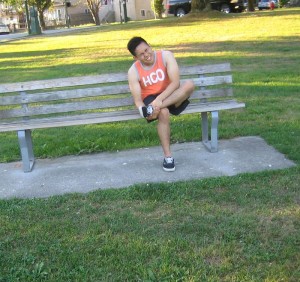Swimmer’s itch is an itchy rash that happens after swimming or wading outdoors especially in freshwater lakes and ponds but sometimes can also happen in salt water.
It is an allergic reaction to parasites that burrows deep into the skin. These parasites can be found in waterfowls or infected birds and animals living near the water. The parasites are not capable of living in humans but the larvae can burrow into the skin and cause infection.
Lakes or ponds with plenty of ducks, geese, gulls and raccoons are usually infected by these parasites. Once the eggs of the parasite reach the water, they begin to hatch on the aquatic snails. The larvae that hatched from the snails infects human.
Symptoms of swimmer’s itch

- Itchiness of the area
- Rash
- Development of pimples after washing and turns into blisters
- Nausea
- Fever
- Lack of sleep due to itching of the area
Treatment
- Mix baking soda with a few drops of water to become a paste and apply on the affected area to lessen the itching and pain.
- In a bathtub fillled with lukewarm water, mix Epsom salt or grounded oatmeal. Mix well until Epsom salt or oatmeal is totally dissolved. It works by relaxing the rash and provides relief to the itchiness.
- Wash the rash using saline water to prevent irritation of the area.
- Mix 1 teaspoon of tea tree oil with 10 teaspoon of olive oil. Apply the mixture on the rashes at least 4-5 times every day. This solution lessens the itchiness and irritation of the affected area.
- Apply calamine lotion since it lessens the itching and prevents the spread of the rashes.
- Avoid scratching the affected area and wear mittens to prevent the risk of impetigo which is an infectious staph infection.
- Cover the rashes with a cool and wet washcloth to relieve the irritation
- Apply apple cider vinegar on the rashes to minimize the itching and allergic reactions.
- Take lukewarm baths mixed with baking soda.
- Apply cool compress or ice to lessen inflammation and pain. Avoid applying ice directly on the rashes; wrap ice in a towel before placing on the affected area to prevent frostbite and making the condition worse.
- Take prescribed over-the-counter antihistamines before sleeping at night to lessen the pain, itchiness and swelling.
Tips
- Use copper sulfate to eliminate snails which are the carriers of the parasites and infections.
- Avoid swimming in places where snails are common and avoid stagnant water where there are plenty of parasites.
- Wash immediately the body after swimming in contaminated water and vigorously dry the body using a towel. Wash swim suits after every use.
- Avoid wading in the shoreline.
- Avoid feeding birds or ducks near the swimming area.
FACT CHECK
https://en.wikipedia.org/wiki/Swimmer%27s_itch
https://www.cdc.gov/parasites/swimmersitch/faqs.html
https://www.mayoclinic.org/diseases-conditions/swimmers-itch/symptoms-causes/syc-20355043
